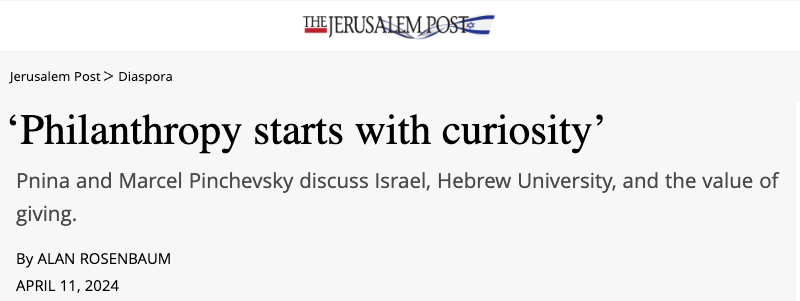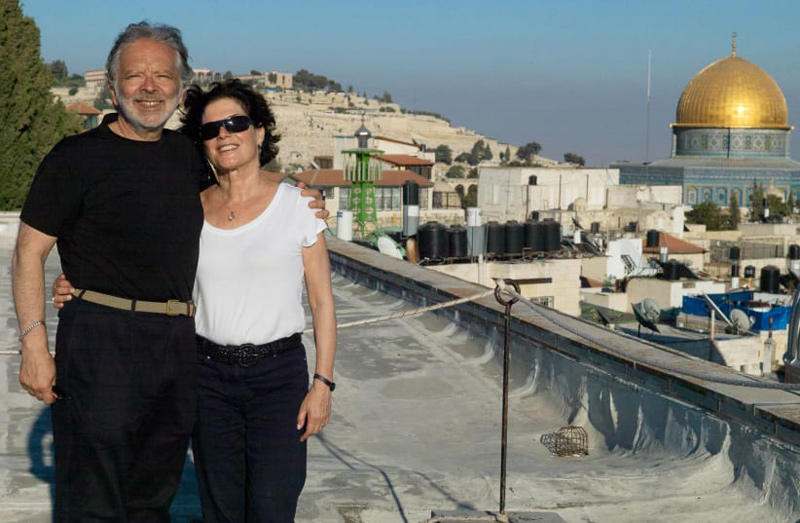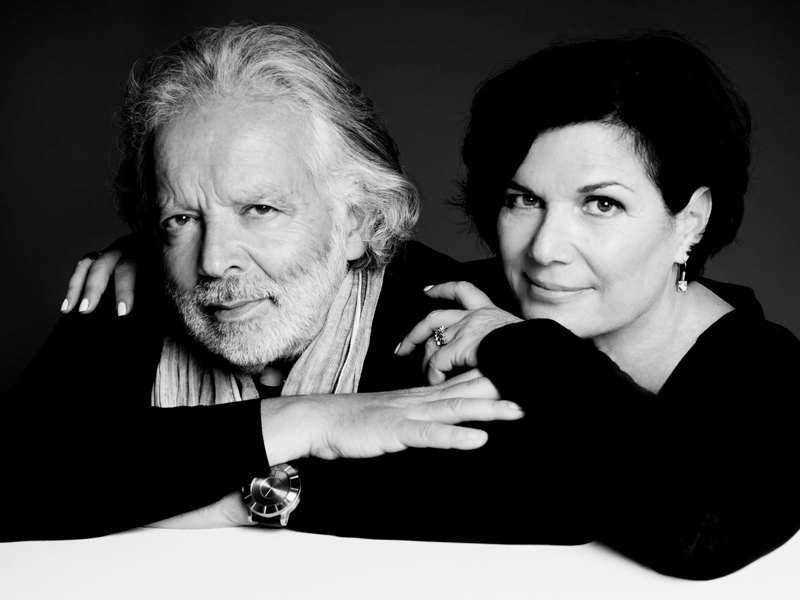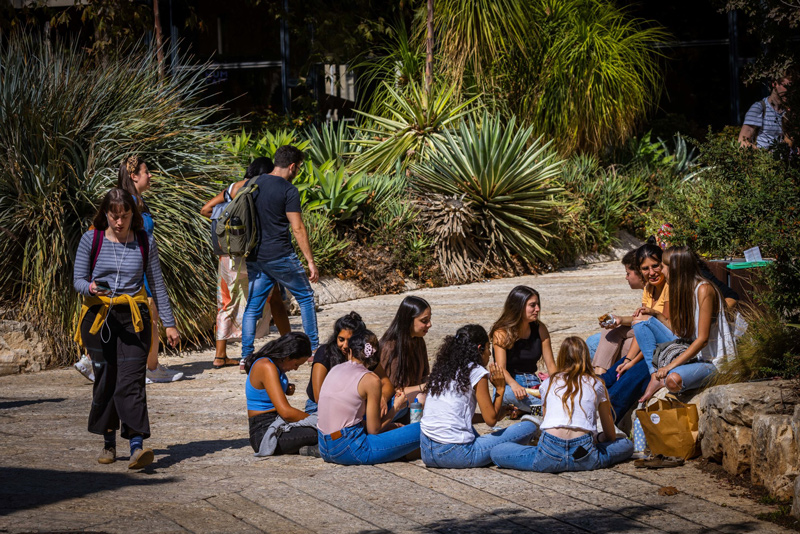

Traveling from their home in Montreal, Pnina and Marcel Pinchevsky arrived in Israel on the night of October 3 in a stopover en route to their trip to Morocco.
“We enjoyed three wonderful days,” recalls Pnina wistfully of their first three days in Israel.
On October 7, in their Tel Aviv rental, they awoke to a new reality when they learned of the Hamas attack on Israel’s South and were forced to take shelter from missiles directed at the city.
“We are back in Canada,” says Pnina, “but our heart is in Israel. In terms of our commitment to Israel and the Hebrew University, we feel even stronger than before.” Pnina has stayed in constant touch with her family and friends in Israel and follows the Hebrew news from Israel on a daily basis.

Says husband Marcel, “The war has accelerated our connection to Israel.
“There is a lot of antisemitism crawling out from under the rocks.
“In Canada, the government’s support for Israel is almost nonexistent. Our connection to Israel is stronger, but our connection to where we live is diminishing because there is a new reality that has surfaced.”
Both Pinchevskys have long-lasting and deep connections to Israel and the Hebrew University of Jerusalem. Pnina was born in Haifa to Holocaust survivors and attended HU, where she earned her degree in social work.

From an early age, she was imbued with a love of education from her mother, whose own formal education ended when she was forced into a concentration camp at the age of 13. After her mother came to Israel, says Pnina, she never stopped studying.
Pnina’s interest in social work led her to visit Berkeley University in California, planning to continue her studies there. In the course of her travels, she visited Montreal, where she met Marcel. They married in 1976 and settled there. Pnina continued her studies in social work at McGill University, where she received her master’s degree in social work. Pnina has an extensive family living in Israel, including two brothers and their families.
Marcel was also born to Holocaust survivors.
‘I believe that curiosity keeps the brain active and keeps people connected’
As a child, he spent time in France and in Israel, arriving in Canada with his family at the age of six. Marcel worked as a management consultant in Canada for many years, while Pnina pursued her career in social work. Today, she works as a psychotherapist in private practice as Marcel pursues a new life chapter in photography.
Today, the Pinchevskys support scholarships at HU’s School of Social Work and IMRIC (Institute for Medical Research Israel Canada) that are granted to deserving students in the school.
“In general,” says Pnina, “hi-tech and science have more support and are considered ‘sexier’ than social work.”
Recalling her conversation with Prof. Mona Khoury-Kassabri, former dean of the School of Social Work at HU and currently the university’s vice-president of Strategy and Diversity, Pnina says, “She said that social work will never become a credible profession like others unless it has a very good body of research. We agree and support her thoughts. This has happened at Hebrew University in terms of its expertise in trauma. We believe in the profession, and we believe that people don’t know enough about it. So many parts of our lives are helped by social work. We felt it was important to have scholarships and develop research and expertise in the field of social work.”
Adds Marcel, “We found that by supporting social work scholarships, you see the results much more quickly. You don’t have to wait for one or two generations like you have to do with cancer research.
“We met with a few students who are benefiting from the scholarships, and they are already out there, conveying what they learned from their research.
“When someone asks me what is the impact of my money, when you go to the School of Social Work, you see it – it’s there; and you see the recipients of that impact and how it benefits them. I like that.”
One student, says Pnina, is doing research on resilience in recovering from breast cancer. Another is studying the impact of end-of-life issues on healthcare providers.
Warming to the topic, Marcel speaks of his discussions with scholarship recipients. “It is so compelling to listen to their field of study. They talk about what they are studying and how they expect it to benefit the individuals who are the recipients of their knowledge. There’s almost an immediate impact. You can see the recipients of that knowledge really benefiting. The work that they do directly touches the community. For me, it’s a lot sexier than doing studies on nanoparticles and things that I barely understand.”
For Pnina, supporting Hebrew University represents a homecoming of sorts to the school she attended between 1972 and 1975. She smiles when she says that in her wildest dreams, she never anticipated that she would be able to become a financial supporter of the institution.
Marcel says that visiting the school has become part of their annual visits to Israel. “It is an amazing place. It is built on a mountain, and you feel like you are walking on history. It is unlike anything I have ever seen before.”
“Philanthropy starts with curiosity,” says Pnina. “You have to be curious about the world.” Throughout their lives, both Pnina and Marcel have been drawn toward learning and exploring new vistas and, in doing so, bettering the world.
“I believe that curiosity keeps people connected, keeps the brain active, and gives a social connection because when you are curious, you meet more people,” says Pnina. It is good to be happy, she says, but one should not become overly content. “There is always something that you want to understand. Curiosity makes you ask questions to find meaning and help the world. I always talk to my clients – even those who are not Jewish – about tikkun olam, repairing the world – and being nice to your neighbor.”
Pnina and Marcel love to travel, and they always try to incorporate Israel as one of the stops on their journeys.
“Israel is one of our commitments to life,” says Marcel. “Wherever we are going, we say ‘Where shall we go on our way to Israel?’ There are many beautiful places we still want to visit, and Israel is still our destination.” Pnina chimes in, “Once, we went to Israel via Senegal.”
Marcel’s current passion is photography.
“This is the next chapter of my life – to take the photographs that I couldn’t when I was working full time,” he says. In December, he was thrilled to learn that one of his photos was featured in Photo Magazine, which is published in Paris. He is also the director of the annual Au Contraire Film Festival in Montreal, which strives to raise awareness and advocacy for mental health issues through film.
What would Pnina and Marcel advise someone considering philanthropy?
In explaining the need to help others, Pnina quotes the Talmudic sage Hillel, who said, “If I am not for myself, who is for me? But if I am for my own self, what am I? And if not now, when?” “These are the values that are instilled in us,” she says.
“Giving is something which we, as Jews and human beings, should undertake if we have an opportunity to help our fellow man,” says Marcel. “The word that I have always focused on is tzedaka, which means giving of yourself and your time, not just money.”
Pnina has the last word. “We are talking about values and our responsibility to transmit values to our children. “The future of philanthropy is how we choose to raise our children and the kinds of values that we offer.”